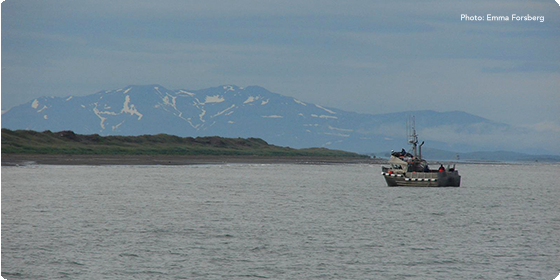
In September 2021, the Environmental Protection Agency (EPA) initiated steps to protect waters in Bristol Bay, Alaska. Under authority conferred by the Clean Water Act (CWA), the EPA initiated a CWA Section 404(c) action to prohibit the discharge of dredged or fill materials into certain waters within Bristol Bay, a watershed of approximately 900 square miles that supports the largest salmon fishery in North America. For years, there have been disputes over resource use and mineral development in the area, including the controversial Pebble Mine that recently captured headlines. Many groups oppose the Pebble Mine project over concerns involving irreparable ecosystem damage from the project. The EPA’s latest actions will likely limit mineral development and provide protections for the important marine ecosystem.
The CWA is the major pollution statute that regulates the discharges of pollutants into water of the United States. Under Section 404, it is generally illegal to discharge dredged or fill materials without a permit from the U.S. Army Corps of Engineers (Corps). Under Section 404(c), the EPA is granted authority to “veto” or override the issuance of a permit by the Corps if the discharges would have an adverse effect on the environment. To exercise this authority, the EPA must go through a lengthy public notice and comment process.
It is rare for EPA to exercise authority under Section 404(c). However, Section 404(c) actions have surrounded the permitting of Pebble Mine since 2014. In 1987, the Pebble deposit area was discovered, and development studies over the next ten years showed that the area is one of the world’s largest gold and copper reserves. In order to operate, the Pebble Mine must receive many environmental permit approvals. This includes an Environmental Impact Statement under the National Environmental Policy Act and a CWA Section 404 permit to discharge dredge or fill materials from the Corps.
During the environmental review process in 2014, the Obama administration preemptively proposed a Section 404(c) action to block the Corps from issuing a Section 404 permit. In 2017, under the Trump administration, the EPA proposed to withdraw its earlier Section 404(c) determination, but then decided not to in 2018. In 2019, the Corps issued a draft Section 404 permit, and the EPA changed course again and issued a decision to withdraw the Section 404(c) determination. Despite EPA lifting the Section 404(c) roadblock, the Corps determined in 2020 that a Section 404 permit could not be issued.
Courts have been involved throughout this lengthy controversy. For example, tribes, environmental groups, and industry members brought suit against the EPA over the withdrawal of 404(c) protections for the Bristol Bay area. The United States Court of Appeals for the Ninth Circuit ultimately issued a decision in June 2021 that found the EPA can only withdraw a Section 404(c) Proposed Determination if it is “unlikely to have an unacceptable adverse effect.” The court remanded the case to the district court, and the EPA was required to file a proposal for additional proceedings. If the lower court grants EPA’s latest motion to restore the Section 404(c) Proposed Determination to prohibit discharges in Bristol Bay waters, then the EPA’s determination process will continue.
A schedule for the determination process has not yet been announced at this time. After many years of uncertainty and inconsistent agency action, stakeholders may finally have clarity about protections against discharged materials in the Bristol Bay watershed, with potentially significant implications for mineral development in the area.












